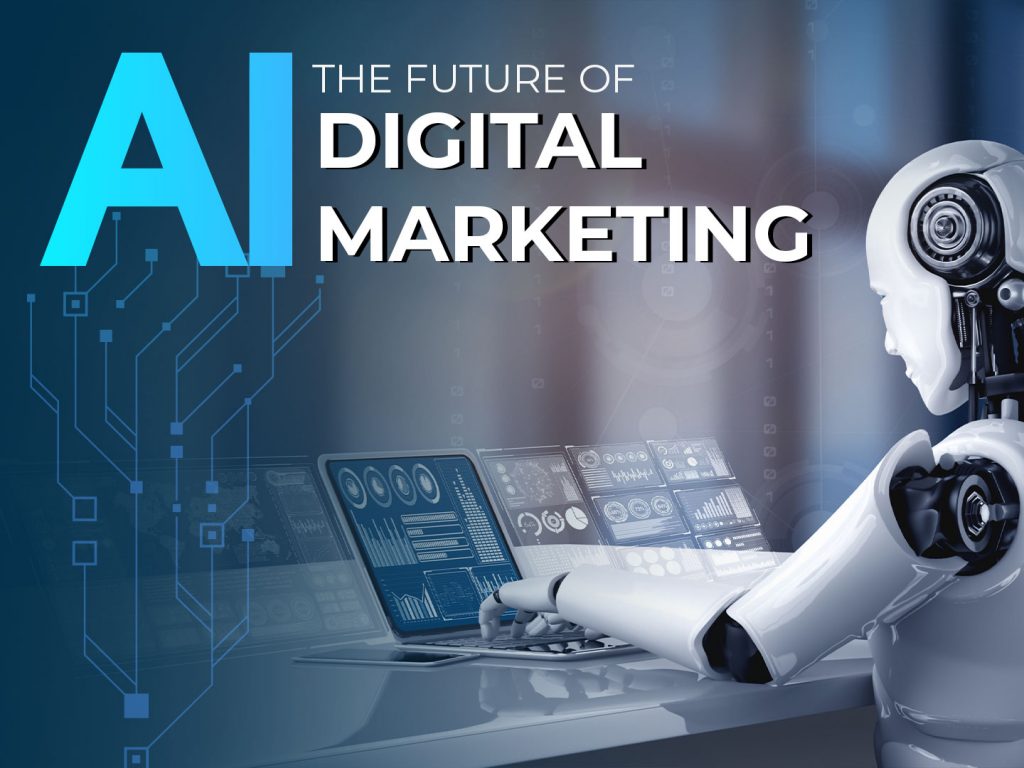In the ever-evolving landscape of digital marketing, artificial intelligence (AI) has become a pivotal force in shaping strategies and predicting trends. This article delves into the dynamic integration of AI within the realm of digital marketing, particularly focusing on search engine optimization (SEO). We explore how AI is revolutionizing predictive SEO, transforming user experiences, and providing unprecedented insights that enable marketers to craft proactive, future-oriented campaigns. The nexus of AI and digital marketing is not just about adapting to changes; it’s about anticipating and leading the charge in an increasingly competitive digital world.
Key Takeaways
- AI-driven predictive analytics in SEO enable marketers to anticipate and respond to future search trends and algorithmic changes.
- The integration of AI in search dynamics enhances the user experience through personalization and intent prediction, creating more effective SEO pathways.
- Machine learning and AI technologies are decoding complex search patterns, offering intelligent optimization techniques for SEO.
- Predictive insights from AI are crucial for SEO success, allowing for strategic forecasting and content strategies that align with future trends.
- AI-enhanced user journeys indicate a shift from reactive to proactive SEO, utilizing predictive power to transform data into actionable strategies.
The Evolutionary Nexus: AI’s Role in Predictive SEO and Search Dynamics

The Emergence of Predictive Analytics in SEO
The integration of predictive analytics into SEO has marked a significant shift towards a more data-driven approach to digital marketing. By harnessing the power of machine learning and data mining, SEO experts can now forecast future trends and user behaviors with remarkable accuracy. This foresight allows for the optimization of various aspects of SEO, from keyword selection to content creation.
- Predictive analytics empowers SEO strategists to anticipate market trends by analyzing patterns in search query data and online consumer behavior.
- It informs strategic decisions, enabling businesses to adapt to changes in search patterns proactively.
- Companies utilizing predictive analytics can maintain a competitive edge, with some seeing up to an 8% increase in performance metrics.
Predictive analytics is not just a trend but a strategic pivot that is reshaping the SEO landscape, offering a profound edge in the digital market.
The adoption of predictive analytics in SEO is a testament to its efficacy. In industries like e-commerce, it has revolutionized marketing strategies, leading to increased organic traffic and higher conversion rates. As the nexus of AI and SEO strengthens, those who invest in predictive insights today are poised to lead the SERPs of tomorrow.
AI’s Impact on Search Algorithm Evolution
The integration of AI into search algorithms marks a pivotal shift in digital marketing strategies. AI’s predictive models are forecasting the evolutionary trends of search engines, allowing SEO professionals to stay ahead of the curve. By understanding and adapting to these changes, marketers can ensure their content remains visible and relevant.
- AI algorithms analyze vast amounts of data to enhance SEO precision.
- They foster a more intuitive and user-focused search environment.
- AI’s role in SEO is becoming increasingly symbiotic and integral to success.
The future of SEO is not just about adapting to algorithms; it’s about crafting strategies that resonate with the essence of the searcher’s journey.
As AI continues to define the future of SEO, it’s clear that the ability to anticipate and adapt to algorithmic shifts with AI precision will be crucial for maintaining a dominant online presence. The transformative power of AI in SEO is not only about smarter search algorithms but also about creating content that meets the sophisticated demands of users and search engines alike.
Case Studies: AI’s Proactive Influence on SEO
The integration of AI into SEO strategies has not only been theoretical but also practical, with numerous success stories emerging. AI’s proactive role in SEO is reshaping how marketers approach organic search. For instance, the case of AIContentfy demonstrates the transformative power of AI in driving traffic. Within just 12 months, their use of AI-powered tools and services led to a staggering increase from 0 to 200k in website traffic, showcasing the potential of AI in SEO.
The proactive use of AI in SEO has proven to be a game-changer, enabling unprecedented levels of efficiency and effectiveness in content strategy and user engagement.
The following list highlights key areas where AI has made a significant impact:
- Personalization and user intent
- Content strategy informed by AI insights
- Semantic search enhancements
- Technical SEO audits powered by AI
- Adaptation to AI-driven search algorithms
These areas represent just a snapshot of AI’s influence on SEO, with the potential for even greater advancements as technology evolves.
Reimagining SEO: How AI Transforms Search Engine Dynamics and User Experience

Enhancing User Search Journeys with AI
The integration of AI into search engines has marked a pivotal shift from a keyword-centric to a user-centric approach in SEO. AI’s ability to interpret search intent has led to a more nuanced understanding of user queries, enabling the delivery of targeted and relevant search results. This evolution in search dynamics is not just about recognizing words but about grasping the user’s underlying needs and intentions.
The enhanced precision in discerning user intent through AI algorithms has transformed the SEO landscape, making the user experience more personalized and relevant.
As AI continues to evolve, we can expect search engines to become even more adept at providing intelligent responses to the complex queries of users. This progression promises to further refine the user experience, ensuring that each search journey is as efficient and satisfying as possible.
- Understanding User Behavior: AI decodes the nuances of search queries, going beyond keywords.
- Personalized Results: Search engines deliver content that aligns with individual user needs.
- Continuous Learning: Machine learning algorithms adapt and improve with each interaction.
Personalization and AI: The New Frontier in User Experience
In the digital marketing realm, personalization powered by AI is revolutionizing how we approach SEO. By analyzing vast amounts of user data, AI enables the creation of highly tailored content, ensuring that each user feels uniquely understood. This shift towards personalization is not just a trend; it’s a transformative movement that’s setting new standards for the user experience.
- Hyper-targeted content strategies are now possible, thanks to predictive analytics that delve into user intent with remarkable precision.
- Engagement metrics, search history, and user behavior inform content that resonates on an individual level, making personalization a critical component in the SEO toolkit.
The ABCs of artificial intelligence personalization are simple: understand the user, deliver relevance, and enhance satisfaction. This approach leads to happier online shoppers, higher conversion rates, and a better return on investment.
As we look to the future, the integration of GenAI in sectors like telecom and FinServ highlights the potential for even more sophisticated personalization. The ability to curate content streams or services that adapt in real-time to the user’s context is not a distant dream but an impending reality. Marketers must now prioritize a user-centric approach over a keyword-centric one, recognizing that the path to SEO success is intricately linked with the quality of the user experience.
The Symbiosis of AI and User Intent Prediction
The integration of AI in SEO has ushered in a new era where understanding the nuances of user queries is paramount. AI’s ability to decode search intent transforms the SEO landscape, making it possible to tailor content that aligns with the user’s needs and expectations.
- AI-driven insights predict shifts in consumer interests.
- Anticipation of trends allows for a proactive content strategy.
- Enhanced relevance and personalization of search results.
By predicting how users interact with various elements on a page, AI can guide SEO specialists to optimize site structure and content placement, leading to improved user experience and SEO outcomes.
The predictive power of AI in SEO is not just about reacting to current trends but about forecasting future user behavior. This foresight enables businesses to stay ahead of the curve, ensuring their digital marketing strategies remain effective and competitive.
The Algorithmic Alchemist: AI as the Future of SEO

Decoding Search Patterns with Machine Learning
Machine learning has become the backbone of modern SEO, enabling search engines to decode complex search patterns and deliver more accurate results. By analyzing vast amounts of data, these intelligent systems can identify subtle nuances in user behavior and search intent, leading to a more personalized search experience.
For digital marketers, this evolution means a shift from keyword stuffing to creating content that aligns with the semantic richness that machine learning algorithms favor. The table below illustrates the transition from traditional to AI-driven SEO tactics:
| SEO Aspect | Traditional Approach | AI-Driven Approach |
|---|---|---|
| Keyword Usage | High Density | Semantic Relevance |
| Content Creation | Quantity Focused | Quality & Context |
| User Intent | Broad Matching | Precise Prediction |
| Algorithm Adaptability | Manual Updates | Continuous Learning |
By embracing machine learning, marketers can craft strategies that are not only effective today but also adaptable to the future shifts in search algorithms and user preferences.
The predictive power of machine learning in SEO cannot be overstated. It allows for the anticipation of trends and the forecasting of algorithmic shifts with unprecedented precision, ensuring that digital marketing strategies remain ahead of the curve.
AI SEO Masterclass: Intelligent Optimization Techniques
In the realm of digital marketing, AI is revolutionizing SEO by offering unprecedented intelligent optimization techniques. By harnessing the power of machine learning and natural language processing, marketers can now craft strategies that are not only reactive but also proactive in nature.
The key to successful AI integration in SEO lies in understanding and applying the right tools and software. Here’s a brief overview of the essential components:
- Understanding AI and Its Role in SEO: Grasping the Fundamentals of AI’s Capabilities and Limitations.
- Machine Learning Algorithms and SEO: Utilizing predictive models to analyze and adapt to search patterns.
- Natural Language Processing for Content Optimization: Enhancing content relevance and readability for both users and search engines.
- AI-Powered Keyword Research: Identifying high-impact keywords with precision.
- Predictive Analytics in SEO: Anticipating Future Trends and Algorithmic Shifts.
By integrating AI into SEO practices, businesses can achieve a competitive edge, ensuring their content resonates with both current and future search engine algorithms.
AI’s effectiveness is not limited to global SEO; it is also particularly effective in local SEO optimization. By analyzing local search trends and optimizing for geo-specific keywords, businesses can significantly improve their local search visibility.
The SEO Crystal Ball: Leveraging Predictive Insights
In the realm of digital marketing, the integration of AI into SEO strategies has opened the door to a new era of predictive insights. By harnessing the power of AI, marketers can now forecast search trends and user behaviors with remarkable accuracy, ensuring that their content remains relevant and visible in an ever-evolving digital landscape.
The foresight offered by AI is not just about staying ahead of the competition; it’s about creating a sustainable and proactive SEO strategy that adapts to the changing tides of online search dynamics.
Predictive analytics in SEO goes beyond mere speculation. It involves a systematic analysis of data patterns to anticipate future outcomes. Here’s a glimpse of the impact this approach can have on key performance indicators (KPIs):
| KPI | Before Predictive Analytics | After Predictive Analytics |
|---|---|---|
| Organic Traffic | Moderate | Significant Increase |
| Conversion Rates | Average | Notably Higher |
| User Engagement | Inconsistent | Steadily Improving |
Organizations that embrace predictive analytics today are positioning themselves as the frontrunners of tomorrow’s search engine rankings. The convergence of AI and SEO is not just transforming SERPs; it’s providing marketers with an invaluable edge in the digital arena.
Predictive Insights: Harnessing AI for SEO Success

Forecasting Algorithmic Shifts with AI Precision
The AI revolution brings to light the dynamic nature of search algorithms. Search engines are constantly evolving, and AI’s predictive models can forecast these evolutionary trends. Doing so enables SEO professionals to craft content that aligns with the trajectory of search engine algorithms, ensuring sustained visibility.
For instance, by analyzing search query data, marketers can identify emerging patterns and capitalize on them for content creation. This strategy is not only about understanding current search intent but also predicting future queries.
In the ever-evolving landscape of Search Engine Optimization (SEO), artificial intelligence (AI) has emerged as a formidable force, particularly through the adoption of predictive analytics. As businesses strive to gain a competitive edge, predictive analytics is redefining how SEO professionals approach their strategies.
Where traditional SEO tactics might focus on current keyword trends and SERP analysis, AI-fueled predictive analytics digs deeper into the ‘why’ and ‘how’ behind user searches. Understanding these underlying patterns gives rise to a more robust, future-proof strategy. Businesses that implement AI-driven insights can predict shifts in consumer interests or behaviors and adjust their content accordingly, capitalizing on trends before they go mainstream.
Navigating Predictive Analytics for Strategic SEO Insights
The integration of predictive analytics in SEO marks a significant shift towards a more informed and proactive approach to search engine optimization. By leveraging AI-driven tools, marketers can anticipate and adapt to changes in search behavior, ensuring their content remains relevant and visible.
- Understanding the current landscape of search queries
- Identifying emerging trends and user needs
- Aligning content strategy with predictive insights
This strategic foresight allows for the optimization of content to not only meet current demands but also to prepare for future shifts in user search patterns. The ability to forecast these changes and implement them into SEO strategies gives businesses a competitive edge in the digital marketplace.
The nexus of AI and SEO is revolutionizing SERPs, providing marketers with unprecedented strategic insights.
As we demystify AI’s influence on SERP, it becomes clear that predictive analytics is not a mere trend but a fundamental component of a successful SEO strategy. Organizations that harness these insights are poised to lead in search engine rankings, transforming data into actionable strategies for long-term success.
AI-Enhanced Content Strategies for Future Trends
In the realm of digital marketing, AI-enhanced content strategies stand at the forefront of innovation, shaping the way brands interact with their audiences. AI tools are not here to supplant human creativity but to bolster it with data-driven insights, enabling marketers to craft content that resonates deeply with their target demographics.
By analyzing content performance and suggesting improvements, AI facilitates the creation of material that aligns with audience preferences and emerging trends. This proactive approach to content strategy ensures that businesses are not just keeping pace with the current digital landscape but are also poised to leap ahead.
The predictive capabilities of AI extend beyond mere content suggestions. They delve into the intricate language patterns and structures that can elevate user engagement. Here’s a glimpse into how AI can transform content strategies:
- Analyzing and predicting topic relevance
- Suggesting content types with high engagement potential
- Identifying nuanced language that enhances readability
- Forecasting shifts in consumer interests or behaviors
Embracing AI’s predictive analytics allows businesses to anticipate and capitalize on trends before they become mainstream. This anticipation is not just smart; it’s a strategic imperative in the fast-paced world of digital marketing.
AI-Enhanced User Journeys: Crafting the Ultimate SEO Pathways

Mapping the Consumer Search Experience with AI
In the ever-evolving realm of digital marketing, AI stands at the forefront of revolutionizing the consumer search experience. By mapping out the search journey, AI enables a deeper understanding of user behavior and preferences. This insight is critical for creating a seamless, customer-centric ecosystem that resonates with the audience’s needs and expectations.
The integration of AI into search analytics goes beyond mere keyword tracking. It involves a sophisticated analysis of search patterns, enabling marketers to anticipate user queries and tailor content that aligns with future trends. For instance, AI’s predictive capabilities allow for the identification of emerging patterns, which can be leveraged for strategic content creation.
The true power of AI lies in its ability to transform vast amounts of data into actionable insights, driving SEO strategies that are both proactive and adaptive.
By harnessing AI for predictive analytics, businesses can stay ahead of the curve, ensuring their digital customer experience remains relevant and engaging. As AI continues to refine the art of understanding and predicting search intent, the potential for SEO innovation is boundless.
Anticipating User Behavior: AI’s Predictive Power
The integration of AI into SEO strategies marks a paradigm shift from reactive to proactive digital marketing. Businesses harnessing AI’s predictive analytics are not just responding to user behavior; they’re anticipating it, setting the stage for a more dynamic and responsive SEO approach. By understanding the ‘why’ and ‘how’ behind user searches, AI enables marketers to foresee and adapt to consumer interest shifts, often before they fully surface.
Predictive analytics transcends traditional keyword optimization, offering a comprehensive enhancement of the user experience. AI’s ability to predict user interactions with website elements informs SEO specialists on how to refine site structure and content placement. This leads to a more intuitive user journey, characterized by lower bounce rates and higher engagement levels.
The foresight AI provides is indispensable for maintaining a competitive edge in SERP rankings, as search algorithms evolve.
The predictive capabilities of AI extend across various SEO facets, from keyword prominence to backlink opportunities. Here’s a glimpse into the areas where AI’s predictive power is transforming SEO:
- Keyword Trends: Identifying and capitalizing on emerging search patterns.
- Content Optimization: Aligning content with predicted future queries.
- User Engagement: Enhancing metrics through optimized user experiences.
- Backlink Prospects: Forecasting valuable linking opportunities.
In essence, AI’s predictive analytics are not just a tool but a strategic asset, enabling SEO campaigns to resonate with future search landscapes and user behaviors.
Transforming Data into Actionable SEO Strategies
The integration of AI into digital marketing has revolutionized the way SEO experts approach data. Machine learning algorithms are now pivotal in transforming vast amounts of data into actionable insights. These insights not only inform current strategies but also shape the future of SEO practices.
By leveraging predictive analytics, SEO professionals can anticipate market trends and user behaviors, ensuring that their strategies remain relevant and effective. This proactive approach is encapsulated in the concept of ‘future-proof SEO strategies‘, where the goal is to stay ahead of the curve by adapting to algorithmic changes before they happen.
- Forecasting Market Trends: Utilizing predictive models to identify upcoming shifts in user search patterns.
- Content Optimization: Tailoring content to align with predicted changes, enhancing relevance and engagement.
- Strategic Planning: Developing long-term SEO strategies based on predictive insights to maintain a competitive edge.
The adoption of predictive analytics in SEO strategies enables experts to analyze large sets of data and forecast future search trends. This analysis can inform keyword selection, content creation, and link-building strategies.
The use of analytical tools and software has become indispensable in deciphering the data that informs these strategies. Pages that rank high on SERPs are often those that have successfully anticipated and catered to both current and future user searches. This level of in-depth analytics provides a clear advantage, allowing for a nuanced understanding of page views, bounce rates, and click-through rates.
Conclusion
As we navigate the nexus of AI and digital marketing, it’s evident that the integration of AI in SEO strategies is not just a trend but a transformative force reshaping the landscape. The predictive capabilities of AI are crafting a new era where marketers can anticipate and adapt to the evolving web with unprecedented precision. By harnessing the power of AI-driven analytics, businesses can forecast consumer behaviors, adapt to algorithmic shifts, and create content that aligns with future search dynamics. The future of digital marketing strategy lies in the intelligent optimization of SEO, where staying ahead means embracing AI as the algorithmic alchemist, turning data into gold. As we look to the horizon, the integration of AI in digital marketing is not just about keeping pace—it’s about setting the pace for a smarter, more proactive approach to SEO that will define success in the digital age.
Frequently Asked Questions
How is AI transforming predictive SEO and search dynamics?
AI is revolutionizing predictive SEO by analyzing vast data sets to identify patterns and trends that inform future strategies. It enables marketers to anticipate changes in consumer behavior and search algorithm updates, allowing for proactive and adaptive SEO campaigns.
What impact does AI have on search algorithm evolution?
AI’s impact on search algorithms is significant, as it allows for more sophisticated understanding and prediction of user intent. This results in algorithms that are better at delivering relevant search results, thereby improving the overall user experience.
Can AI enhance user search journeys and personalization?
Yes, AI can significantly enhance user search journeys by providing personalized results based on individual search history, preferences, and behavior. This level of personalization ensures that users find the information they need more efficiently.
How does machine learning decode search patterns for SEO?
Machine learning algorithms analyze search data to detect patterns and correlations that might not be evident to human analysts. This information can be used to predict future search trends and optimize content accordingly for better SEO performance.
What are the AI-enhanced content strategies for future SEO trends?
AI-enhanced content strategies involve using AI to forecast upcoming trends and consumer interests, allowing businesses to create content that aligns with future search queries. This proactive approach can give companies a competitive edge in SEO.
How can businesses stay ahead in an AI-driven SEO world?
Businesses can stay ahead by continuously monitoring AI advancements, integrating predictive analytics into their SEO strategies, and adapting to algorithmic shifts with agility. Staying informed and flexible is key to success in an AI-driven SEO landscape.








Thanks for sharing. I read many of your blog posts, cool, your blog is very good.
Your point of view caught my eye and was very interesting. Thanks. I have a question for you.